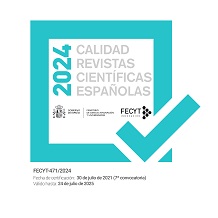Perception of sources of support that facilitate adherence to the treatments
Abstract
Introduction: Non-adherence to treatments increases the probability of therapeutic failure and unnecessary complications.
Objective: To explore the sources of support perceived by patients with chronic diseases that facilitate adherence to treatment.
Method: Qualitative descriptive study with a phenomenological approach, in which eight complex chronic patients were recruited, without distinction of gender or age, residents of Barcelona, and who, after evaluating pharmacological adherence with the Morisky-Green test and the test of Batalla resulted in being adherent to the therapeutic regimen. After which, two open questions were asked that were recorded on an audio device and transcribed verbatim. For data analysis, the method Colaizzi was used.
Results: Three thematic groups emerged: 1) Having family support; 2) Understanding of the disease and strategies that facilitate adherence to treatments; and 3) Relationship with reference professionals.
Conclusions: The most important source of support perceived by the participants is the family, coinciding with other authors. The finding of this study is that shows medicine and nursing are evidenced as instigators that promote their empowerment and as a recognized source of influence that has allowed their assimilation and training to adopt measures that help them follow the pharmacotherapeutic guidelines.
Downloads
-
Abstract890
-
PDF (Español (España))697
-
PDF697
References
OMS. Adherence to long-term therapies: evidence for action. [Online].; 2003 [cited 2019 12 22 [ISBN 92 4 154599 2]. Available from:
https://apps.who.int/iris/bitstream/handle/10665/42682/9241545992.pdf?sequence=1&isAllowed=y
INE. Encuesta Europea de Salud en España 2020. INE-MSCBS. [Online].; 2021 [cited 2022 01 12. Available from:
Vlasnik J, Aliotta S, DeLor B. Medication adherence: factors influencing compliance with prescribed medication plans Elsevier, editor; Case Manager; 2005.
Di Matteo M. Social support and patient adherence to medical treatment: A meta-analysis. Health Psychology. 2004; 23(2): p. 207–218.
Zabalegui A, Vidal A, Soler DL. Análisis empírico del concepto de afrontamiento. Enfermería Clínica. 2002; 12(1): p. 29-38.
Lindner H, Menzies D, Kelly J, Taylor S. Coaching for behaviour change in chronic disease: A review of the literature and the implications for coaching as a self-management intervention. Aust J Prim Health. 2003; 9(3): p. 177-185.
Burns N, Grove SK. Investigación en enfermería. 3rd ed. Barcelona: Elsevier; 2004.
Gencat.cat. Salut.gencat.cat. [Online].; 2018 [cited 2019 12 10. Available from: https://scientiasalut.gencat.cat/handle/11351/3305?show=full.
Morisky D, Green L, Levine D. Concurrent and predictive validity of a self-reported measure of medication adherence. Med Care. 1986 Jan;24(1):67-74. 1986 Jan 24(1); p. 67-74.
Batalla C, Blanquer A, Ciurana R, García M, Cases J, Pérez A, et al. Cumplimiento de la prescripción farmacológica en pacientes hipertensos. Aten Primaria. 1986; 3: 21-24. 1986; 3: p. 21-24.
Pagès-Puigdemont N, Valverde-Merino M. Métodos para medir la adherencia terapéutica. Ars Pharm. 2018. Septiembre, 20; 59(3): p. 163-72.
Rodríguez-Chamorro M, García-Jiménez E, Amariles P, Rodríguez A, Faus M. Revisión de tests de medición del cumplimiento terapéutico utilizados en la práctica clínica. [en línea] 2008; 40 (8): 413-417. Aten. Primaria. 2008; 40(4): p. 413-417.
Limaylla M, Ramos N. Métodos indirectos de valoración del cumplimiento terapéutico. Ciencia e investigación. 2017 Agosto 2; 19(2).
Colaizzi PF. Psychological Research as the Phenomenologist Views It. In Valle, R.S. & King, M. (ed) Existential Phenomenological Alternatives for Psychology. Oxford University Press. 1978; p. 48-71.
Rosland A, Heisler M, Choi H, Silveira M, Piette J. Family influences on self-management among functionally independent adults with diabetes or heart failure: do family members hinder as much as they help? [Online].; 2010 [cited 2020 7 16. Available from:
https://www.ncbi.nlm.nih.gov/pmc/articles/PMC3712767/
Schaie K, Willis S. Psicología de la edad adulta y la vejez Pearson Educación, SA. 5th ed. Madrid: Pearson Educación, SA; 2003.
Hogan A, Rastogi D, Rinke M. A Quality Improvement Intervention to Improve Inpatient Pediatric Asthma Controller Accuracy. Hosp Pediatr. 2018; 8(3): p. 127-134.
Epitropakis C, DiPietro E. Medication compliance protocol for pediatric patients with severe intellectual and behavioral disabilities. J Pediatr Nurs. 2015 Mar-Apr; p. 329-332.
Wekland J. Family somatics"Family somatics"A neglected edge. Fam Process. Family somatics. 1977; 16(3): p. 263-272.
Bosworth H, Fortmann S, Kuntz J, Zullig L, Mendys P, Safford M, et al. Recommendations for Providers on Person-Centered Approaches to Assess and Improve Medication Adherence. Journal of general internal medicine. 2017; 32(1): p. 93–100.
McMullen C, Safford M, Bosworth H, Phansalkar S, Leong A, Fagan M, et al. Patient-centered priorities for improving medication management and adherence. Patient Educ Couns. 2015; 98(1): p. 102-110.
The works published in this magazine are subject to the following terms:
1. The Publications Service of the University of Murcia (the publisher) preserves the copyright of the published works, and encourages and allows the reuse of the works under the license for use stated in point 2.
© Servicio de Publicaciones, Universidad de Murcia, 2011 (© Publications Service, University of Murcia, 2011)
2. The works are published in the electronic edition of the journal under Creative Commons Reconocimiento-NoComercial-SinObraDerivada 3.0 España(texto legal) “ a Attribution-NonCommercial-NoDerivatives 3.0 Spain license (legal text)”. They can be copied, used, broadcasted, transmitted and publicly displayed, provided that: i) the authorship and original source of their publication (journal, publisher and URL) are cited; (ii) are not used for commercial purposes; iii) the existence and specifications of this license is mentioned.
3. Conditions of self-archiving. Authors are allowed and encouraged to electronically disseminate the pre-print (pre-reviewed ) and / or post-print (reviewed and accepted for publication) versions of their works prior to publication, as it ensures a wider circulation and dissemination which may lead to a possible increase in its mention and a higher scope among the academic community. RoMEO color: green.












